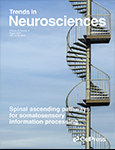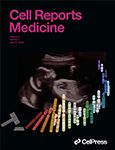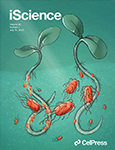Supporting publications

Cell Metabolism publishes reports of novel results in any area of metabolic biology, from molecular and cellular biology to translational studies. The unifying theme is homeostatic mechanisms in health and disease, from simpler model systems all the way to the clinic. Published work should not only be of exceptional significance within its field, but also of interest to researchers outside the immediate area. Cell Metabolism also provides expert analysis and commentary on key findings in the field. The journal's mission is to provide a forum for the exchange of ideas and concepts across the entire metabolic research community, cultivating new areas and fostering cross-disciplinary collaborations in basic research and clinical investigation.

Neuron has established itself as one of the most influential and relied upon journals in the field of neuroscience. The editors embrace interdisciplinary strategies that integrate biophysical, cellular, developmental, and molecular approaches with a systems approach to sensory, motor, and higher-order cognitive functions. Neuron serves as one of the premier intellectual forums of the entire neuroscience community.

Cell publishes findings of unusual significance in any area of experimental biology, including but not limited to cell biology, molecular biology, neuroscience, immunology, virology and microbiology, cancer, human genetics, systems biology, signaling, and disease mechanisms and therapeutics. The basic criterion for considering papers is whether the results provide significant conceptual advances into, or raise provocative questions and hypotheses regarding, an interesting and important biological question. In addition to primary research articles in four formats, Cell features review and opinion articles on recent research advances and issues of interest to its broad readership in the leading edge section.

The Cell Reports Portfolio includes gold open-access journals that span life, medical, and physical science. Our mission is to make cutting-edge research and methodologies across disciplines available to a wide readership.
Cell Reports publishes high-quality papers across the entire life sciences spectrum. The primary criterion for publication in Cell Reports is new biological insight.
Cell Reports features cutting-edge research, with a focus on a shorter, single-point story, called a report, in addition to a longer research article format and resources. Resources highlight significant technical advances or major informational data sets that provide new biological insight. Reviews covering recent literature in emerging and active fields are also welcome.
The professional in-house editors of Cell Reports work closely with authors, reviewers, and the journal's scientific advisory board. The advisory board comprises current and future leaders in their respective fields who guide the journal with regard to its scope, its content, and the quality of the papers it publishes. However, editorial decisions at Cell Reports are made independently by its in-house editors.

Trends in Endocrinology & Metabolism is a leading Reviews journal in the fields of metabolism and endocrinology. We publish polished, concise, highly read and cited articles of topics at the cutting edge covering basic, translational, and clinical aspects; from state-of-the-art treatments of endocrine diseases to new developments in molecular biology. Read about recent advancements in diabetes, endocrine diseases, obesity, neuroendocrinology, immunometabolism, molecular and cellular biology, and a host of other areas.
TEM serves as an invaluable source of information for researchers, clinicians, lecturers, teachers and students. Reviews and Opinion articles form the foundation of each monthly issue. Reviews are invited from leading researchers in a specific field and objectively chronicle recent and important developments. Opinion articles provide a forum for debate and hypotheses. Our shorter pieces include Science & Society that highlight topical issues at the intersection of science, society and policy, Spotlights; that focus on exciting recent developments in the literature, and single-point hypotheses as Forum articles. Responses to previously published TEM content are welcome and encouraged in the form of Letters.
All articles are subjected to stringent peer-review, ensuring balance and accuracy.

Trends in Neurosciences For over four decades, Trends in Neurosciences (TINS) has been a prominent source of inspiring reviews and commentaries across all disciplines of neuroscience. TINS is a monthly, peer-reviewed journal, and its articles are curated by the Editor and authored by leading researchers in their respective fields. The journal communicates exciting advances in brain research, serves as a voice for the global neuroscience community, and highlights the contribution of neuroscientific research to medicine and society.

Cell Reports Medicine is a premium open-access journal from Cell Press publishing cutting-edge research in translational and clinical biomedical sciences that inform and influence human health and medicine.
The content published in Cell Reports Medicine reaches a broad range of scientists and clinicians across the spectrum of medical disciplines, ensuring that your work will be both visible and accessible. The journal publishes original research that ranges from exciting concepts in human biology, health, and disease to all phases of clinical work. We encourage submissions featuring innovative ideas that open up new directions in clinical research and practice, as well as studies that provide critical information that enriches our understanding of current standards of care in diagnosis, treatment, and prognosis. This includes, but is not limited to, translational studies, clinical trials in all areas of medicine including long-term trial follow-ups as well as work in genomics, biomarker discovery, and developments in technology that contribute to diagnostics, treatment, and healthcare. Studies based on vertebrate model organisms also fall within the scope of the journal, provided that the results are directly relevant to human health and disease.
Like our sister journal Cell Reports, we will consider impactful, single-point papers called reports, in addition to longer articles. Large datasets, techniques, and tools for the community can also be considered under the article format. We will also publish reviews covering recent literature in emerging and active fields.
The professional in-house scientific editors at Cell Reports Medicine work closely with authors, reviewers, and the journal's editorial board to ensure exemplary editorial process, fair and robust peer review, and rapid dissemination and communication of your research.

Cell Reports Methods is an open access, multidisciplinary journal from Cell Press publishing significant methodological advances of broad interest. The primary criterion for publication in Cell Reports Methods is a robust, reproducible method that will spur scientific progress. We will also consider papers presenting a new tool or set of reagents that will be of significant utility and interest to the community. Cell Reports Methods publishes shorter, single-point stories, called Reports, in addition to a longer Article format. Areas of interest include innovations in sequencing and imaging technologies, genome editing, single-molecule approaches, computational methods, biotechnology, and synthetic biology.
We are committed to open science and scientific reproducibility. To promote these goals, we offer the following to our authors, reviewers, and readers:
- Opportunity to co-publish bench-top protocols through collaboration with STAR Protocols
- Application of the STAR Methods structure to ensure transparency and reproducibility
- Data and code required for reviewers at the time of submission
- Mandatory deposition of raw data at resubmission

iScience Science has many big remaining questions. To address them, we will need to work collaboratively and across disciplines. The goal of iScience is to help fuel that type of interdisciplinary thinking. iScience is a new open access journal from Cell Press that provides a platform for original research in the life, physical, earth, and health sciences. The primary criterion for publication in iScience is a significant contribution to a relevant field combined with robust results and underlying methodology. The advances appearing in iScience include both fundamental and applied investigations across this interdisciplinary range of topic areas. To support transparency in scientific investigation, we are happy to consider replication studies and papers that describe negative results.
We know you want your work to be published quickly and to be widely visible within your community and beyond. With the strong international reputation of Cell Press behind it, publication in iScience will help your work garner the attention and recognition it merits. Like all Cell Press journals, iScience prioritizes rapid publication. Our editorial team pays special attention to high-quality author service and to efficient, clear-cut decisions based on the information available within the manuscript. iScience taps into the expertise across Cell Press journals and selected partners to inform our editorial decisions and help publish your science in a timely and seamless way.

Heliyon is an all-science, open access journal that is part of the Cell Press family. Any paper reporting scientifically accurate and valuable research, which adheres to accepted ethical and scientific publishing standards, will be considered for publication.
Dedicated section editors, associate editor and our in-house team, handle your paper and manage the publication process end-to-end, giving your research the editorial support it deserves.
Every published article will be immediately available on both cell.com/heliyon and ScienceDirect, and will be indexed by PubMed, Scopus, and Web of Science™ Science Citation Index Expanded™ (SCIE), ensuring it reaches the widest possible audience. Heliyon is expected to receive its first impact factor in 2022. Our focus on generating impact via press coverage and social media gives papers the opportunity to be discovered.

Current Biology is a general journal that publishes original research across all areas of biology together with an extensive and varied set of editorial sections. A primary aim of the journal is to foster communication across fields of biology, both by publishing important findings of general interest from diverse fields and through highly accessible editorial articles that explicitly aim to inform non-specialists.
Current Biology publishes papers reporting findings in any area of biology that have sufficient claim to be of general interest—this could be, for example, because the advance is important for a specific field, or because it is intrinsically of wide interest to biologists generally. We have several formats for publishing original research (articles, reports, and correspondences); see our article types page for details.

Immunity publishes papers that report the most important advances in immunology research. The range of subjects includes, but is not limited to, immune cell development and senescence, signal transduction, gene regulation, innate and adaptive immunity, autoimmunity, infectious disease, allergy and asthma, transplantation, and tumor immunology. We also encourage the submission of manuscripts that pertain to related areas of research but have broad implications for immune responses in all aspects of human and experimental animal biology.

Med is a flagship clinical and translational research monthly journal published by Cell Press, the global publisher of trusted and authoritative science journals including Cell, Chem, and Joule. Our mission is to accelerate translation of bench research to the clinic by providing a communication forum for the exchange of knowledge, fresh ideas, and thought-leadership among translational researchers, clinicians, and Biotech and Pharma scientists as well as other medical research stakeholders. Our goal is to sustainably and ethically improve health globally.
Med publishes rigorously vetted original research and state-of-the-art Review and Perspective articles across the translational and clinical continuum. Our translational research articles are deeply rooted in understanding disease mechanisms, with demonstrable functional impact and broad transformative insights. Our clinical studies cover case reports, first-in-human studies, and large-scale clinical trials, including phase IV, which have the potential to change the course of medical research and improve clinical practice.
We are interested in research with likely immediate impact on clinical therapy. These include clinical studies, translational research papers addressing disease mechanism and/or therapies, biotechnology and engineering advances with important clinical impact, and resources (such as informational databases) of broad medical utility. Topics of interest for the journal include but are not limited to:
✚ Aging and health-span interventions – sarcopenia; senescence and senolytic treatments; dietary interventions; hormonal disorders
✚ Biomedical engineering – new device optimization and diagnostic tools
✚ Cancer – immuno-oncology; tumor evolution and cancer genetics; surgery and therapeutic modalities
✚ Cardiovascular and metabolic disease – heart disease; diabetes; obesity; NAFLD/NASH
✚ Genetics and cell-based therapies – medical genomics; CRISPR-based; RNAi; stem cells; organoids; transplantation
✚ Health economics and public policy – global challenges; health access; public health interventions; clinical practices
✚ Human microbiome – mechanistic studies of the human microbiome’s impact on disease
✚ Immunology – allergy and inflammation; autoimmunity; innate immunity; graft-versus host disease; vaccinology
✚ Infectious diseases – HIV/AIDS; SARS; ebola; other bacterial, viral, fungal, or parasitic infections; infectious diseases epidemiology; antimicrobials and resistance
✚ Neurology – Alzheimer’s disease; dementia; cognitive dysfunctions; brain-vascular dysfunction; Parkinson’s and movement disorders; amyotrophic lateral sclerosis; depression; neuroengineering therapies